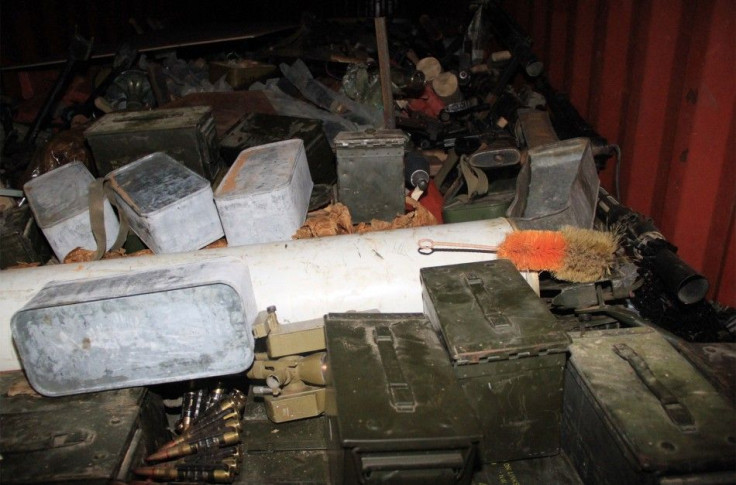Lebanon Intercepts Arms Shipment To Syrian Rebels From Libya

Lebanese intelligence officers are questioning crew members of a ship that set sail from Libya and was found to be carrying a cache of weapons that supposedly were intended to supply opposition forces in Syria.
Eleven crew members of the cargo vessel Luftfallah II have been detained by Lebanese authorities after the Lebanese navy confiscated three shipping containers of weapons and ammunition, including heavy machine guns, artillery shells, rocket launchers and other explosives, found Saturday. The ship was registered in Sierra Leone, though it initially departed from Libya.
The Luftfallah II was en route to the city of Tripoli in northern Lebanon when it was intercepted Thursday by the Lebanese navy and towed Saturday to Selaata, a small port village roughly 30 miles (50 kilometers) north of the capital Beirut.
According to Al Jazeera, a Lebanese security official said the arms shipment was bound for the Free Syrian Army, a coalition group of rebel fighters seeking to overthrow Syrian President Bashar al-Assad.
The Syrian government has repeatedly claimed that weapons are being smuggled through Lebanon to Syrian rebel forces.
The Lebanese coalition government has been largely supportive of Assad. Hezbollah, a political party in Lebanon but deemed a terrorist group by the U.S., has publicly stated its firm support.
The U.S. and E.U. have imposed some sanctions on the Syrian government, though efforts to do so through the U.N. Security Council have met with resistance from Russia and China.
A Year of Death and Violence
Syria has been embroiled in violence for nearly a year following the government's crackdown on an initially peaceful popular movement that began with public demonstrations in January 2011, in the wave of Arab Spring uprisings throughout the Middle East and North Africa.
Protesters, unhappy over social inequity aggravated by high unemployment among young adults and suppression of human rights, demanded Assad's resignation and an end to the Ba'ath Party's nearly five decades of political dominance.
The Syrian military began violently suppressing protesters in May after claiming 11 soldiers had been attacked and killed by armed terrorist groups in the city of Homs.
Armed rebel groups have since risen in numbers to fight the Syrian military, pulling the country into a protracted and bloody conflict, which the U.N. estimates has resulted in over 9,000 deaths since hostilities began.
U.N. peacekeepers have recently been deployed to Syria to uphold a tenuous cease-fire between the military and opposition forces, though reports of new casualties continue to stream in.
© Copyright IBTimes 2025. All rights reserved.





















